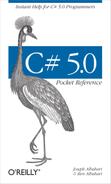Operators can be overloaded to provide more natural syntax for custom types. Operator overloading is most appropriately used for implementing custom structs that represent fairly primitive data types. For example, a custom numeric type is an excellent candidate for operator overloading.
The following symbolic operators can be overloaded:
+ - * / ++ -- ! ~ % & | ^ == != < << >> >
Implicit and explicit conversions can also be overridden (with the
implicit and explicit keywords), as can the literals true and false, and the unary + and -
operators.
The compound assignment operators (e.g., +=, /=) are
automatically overridden when you override the noncompound operators
(e.g., +, /).
An operator is overloaded by declaring an operator function. An operator function must be static, and at least one of the operands must be the type in which the operator function is declared.
In the following example, we define a struct called Note representing a musical note, and then
overload the + operator:
public struct Note
{
int value;
public Note (int semitonesFromA)
{ value = semitonesFromA; }
public static Note operator + (Note x, int semitones)
{
return new Note (x.value + semitones);
}
}This overload allows us to add an int to a Note:
Note B = new Note (2); Note CSharp = B + 2;
Since we overrode +, we can use
+= too:
CSharp += 2;
Equality and comparison operators are often overridden when writing structs, and in rare cases with classes. Special rules and obligations come with overloading these operators:
- Pairing
The C# compiler enforces that operators that are logical pairs are both defined. These operators are (
== !=), (< >), and (<= >=).EqualsandGetHashCodeIf you overload
==and!=, you will usually need to overrideobject’sEqualsandGetHashCodemethods so that collections and hashtables will work reliably with the type.IComparableandIComparable<T>If you overload
<and>, you would also typically implementIComparableandIComparable<T>.
Extending the previous example, here’s how we could overload
Note’s equality operators:
public static bool operator == (Note n1, Note n2){ return n1.value == n2.value; }public static bool operator != (Note n1, Note n2){ return !(n1.value == n2.value); } public override bool Equals (object otherNote) { if (!(otherNote is Note)) return false; return this == (Note)otherNote; } public override int GetHashCode() { return value.GetHashCode(); // Use value's hashcode }
Implicit and explicit conversions are overloadable operators. These conversions are typically overloaded to make converting between strongly related types (such as numeric types) concise and natural.
As explained in the discussion on types, the rationale behind implicit conversions is that they should always succeed and not lose information during conversion. Otherwise, explicit conversions should be defined.
In the following example, we define conversions between our
musical Note type and a double (which represents the frequency in
hertz of that note):
... // Convert to hertzpublic static implicit operator double (Note x){ return 440 * Math.Pow (2,(double) x.value / 12 ); } // Convert from hertz (accurate to nearest semitone)public static explicit operator Note (double x){ return new Note ((int) (0.5 + 12 * (Math.Log(x/440) / Math.Log(2)) )); } ... Note n =(Note)554.37; // explicit conversion double x = n; // implicit conversion
